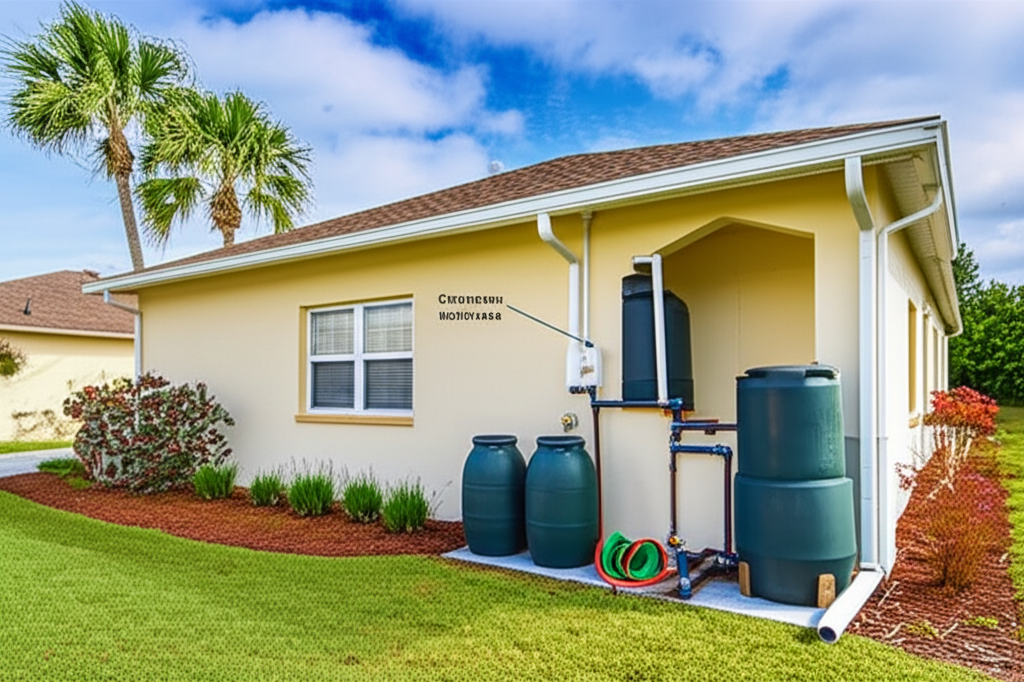
Sustainable Utilities & Systems
Designed specifically for Florida's unique climate and environmental challenges
Sustainable Living in Florida's Unique Climate
Florida's climate presents unique challenges and opportunities for sustainable living. With abundant sunshine, frequent rain, high humidity, and the risk of hurricanes, designing your home's utilities and systems requires careful consideration of these regional factors.
This guide will help you navigate the options for water, energy, waste management, and climate control systems that are specifically suited to Florida's environment, while meeting your sustainability goals and complying with local regulations.
Florida's Climate Considerations
- Abundant sunshine (over 230 sunny days per year)
- High annual rainfall (40-60 inches)
- Hurricane vulnerability and storm surge risks
- High humidity (average 74-86% depending on region)
- Rising sea levels and potential for flooding
Water Systems for Florida Homes
Florida's abundant rainfall provides excellent opportunities for water harvesting, while its proximity to the ocean and vulnerability to saltwater intrusion makes water conservation and management crucial.
Key Considerations
- Florida averages 40-60 inches of rainfall annually
- Rainy season (May-October) provides opportunity for collection
- Water quality concerns in some areas (saltwater intrusion)
- Mosquito prevention essential in water collection systems

- Can reduce water bills by 30-50%
- Ideal for garden irrigation and outdoor cleaning
- First-flush diverters recommended for Florida's heavy rains
- Requires mosquito prevention measures
- Can reduce water usage by up to 40%
- Simple systems require minimal maintenance
- Check local codes - regulations vary by county
- Use biodegradable soaps and detergents
- Whole-house systems protect all water points
- Reverse osmosis for drinking water recommended
- Water softeners help with Florida's hard water
- Regular maintenance required in humid climate
Florida Water Regulations to Know
Rainwater Harvesting
Florida generally encourages rainwater harvesting. The Florida Building Code includes provisions for rainwater harvesting systems, and some counties offer incentives for installation.
Greywater Systems
Regulations vary by county. The Florida Building Code (Plumbing) Chapter 13 covers greywater systems. Permits are typically required for installation.
Cost & ROI Considerations
Sustainable systems often have higher upfront costs but provide significant long-term savings. Here's a breakdown of typical costs and returns for sustainable utility systems in Florida.
| System | Typical Cost | Annual Savings | Payback Period | Lifespan |
|---|---|---|---|---|
| Solar PV System (5kW) | $12,000 - $15,000 | $800 - $1,200 | 8-12 years | 25+ years |
| Battery Storage (10kWh) | $8,000 - $12,000 | $300 - $500 | 15-20 years | 10-15 years |
| Rainwater Harvesting | $3,000 - $8,000 | $200 - $400 | 10-15 years | 30+ years |
| Solar Water Heating | $4,000 - $6,000 | $250 - $400 | 8-12 years | 20+ years |
| High-Efficiency HVAC | $6,000 - $12,000 | $300 - $700 | 7-10 years | 15-20 years |
| Greywater System | $1,500 - $5,000 | $100 - $300 | 10-15 years | 20+ years |
Financing Options
PACE Financing
Property Assessed Clean Energy (PACE) financing allows Florida homeowners to finance renewable energy and energy efficiency improvements with no money down, repaying through property tax assessments.
Green Mortgages
Energy Efficient Mortgages (EEMs) and Green Mortgages allow borrowers to include the cost of energy-efficient upgrades in their home mortgage with better terms.
Finding Local Suppliers & Installers
Working with experienced local professionals ensures your sustainable systems are properly designed, installed, and maintained for Florida's unique conditions.
What to Look For
- Florida-specific experience and knowledge of local codes
- Proper licensing and insurance for your county
- Experience with hurricane-resistant installations
- Knowledge of available incentives and rebates
- Strong warranties and ongoing maintenance support
Questions to Ask
- What financing options do you offer or work with?
- How are your systems designed to withstand hurricanes?
- How do you address Florida's humidity challenges?
- What backup systems do you recommend for power outages?
- How do your systems integrate with each other?
Ready to Design Your Sustainable Florida Home?
Our experts can help you create an integrated system design that's perfect for your needs, location, and budget.